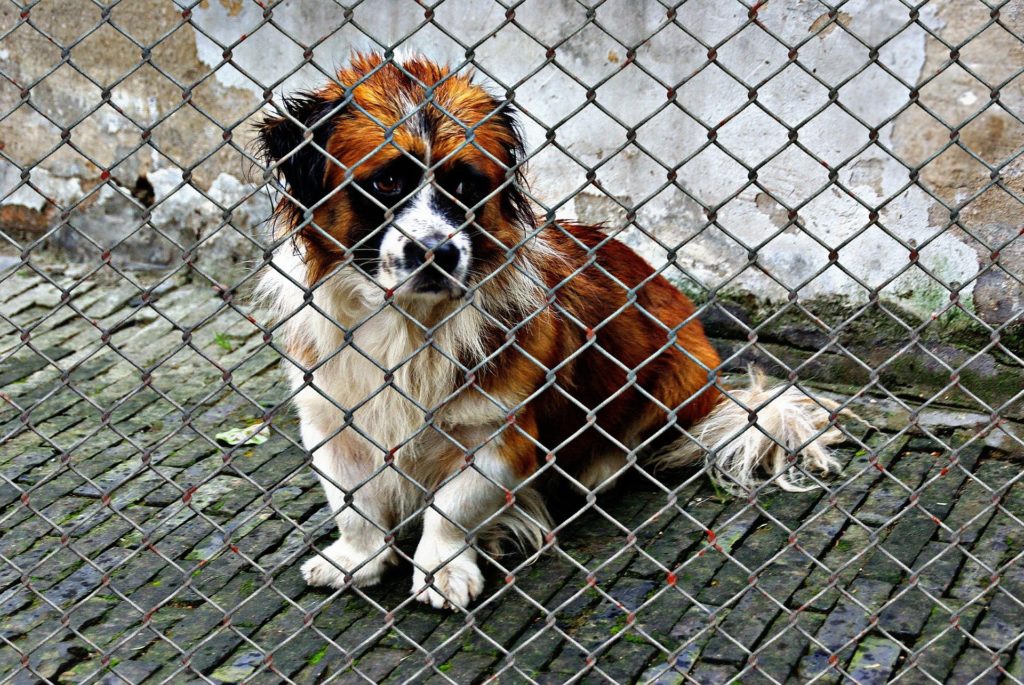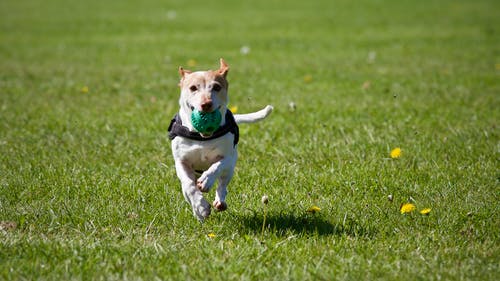Can animal communication help rescued dogs with destructive behaviors?
Because if you’ve ever tried to help rescued dogs, you know they have their own unique set of needs, problems, issues and more.
This actually breaks down into three separate questions.
- Does animal communication work with rescued dogs?
- If so, how could it help specifically?
- Is there a way to talk rescued dogs out of destructive behaviors?
Let’s take question #1 first.
Does animal communication work with rescued dogs?
Yes, it makes a huge difference when you do it right.
So, let’s be clear what it actually means to communicate with dogs.
It means being able to connect heart to heart, mind to mind, psychically, intuitively, mentally, emotionally, telepathically, and energetically.
Knowing how to send and receive information back and forth in a dialogue conversation with animals.
Then, when you receive their information/messages back, knowing how to interpret them accurately and confidently.
It means understanding that dogs are sentient, intelligent, feeling beings who have memories, experiences, history, needs, wants, and desires, just like you do.
You might be wondering – can anyone learn to communicate with animals?
Yes! Every animal lover can discover how and have a great time doing it, too, with amazing results (as you’ll soon see for yourself).
Here’s the thing: If you love animals, you are already connected.
If you use your intuition, then you can learn to focus it on the animal and hear their voice, see what they see in their minds eye, and feel what they feel, know what they know.
If you care about them – and you do – then you can easily learn the practical steps, the tried-and-true techniques, and how it works.
From there, like any other worthy skill, you practice to gain proficiency, confidence and accuracy.
You are born with the ability to send and receive information from others. In fact, you do it all the time every day, even if you’re not aware that you’re doing it.
Your intuitive abilities can be activated, developed, and grown with a bit of effort and training.
Download my FREE Ebook Hidden Secrets to Communicating with Animals – just click on the picture below!

Knowing how to speak to dogs on their level will make ALL the difference in the world in their ability to feel understood, their questions and concerns addressed in a way they understand, and their pains, fears, and anxieties known so you can help them heal.
Knowing what they need and want makes it easier for you to stop chasing your tail on expensive guesswork to solve dog problems you don’t really understand.
Because when you know their unique viewpoint and are clear about what drives their behavior?
And then, when you partner up together to work as a team that understands each other and are speaking the same language?
Everything changes. It is so much easier to solve the problems together when you speak each other’s language.
If you are open enough to consider and explore new concepts, different opinions and experiences, to see the world from your dog’s viewpoint, then you’re on the right track.
Intuitively speaking, you need to be able to use your basic 4 intuitive abilities:
Clairvoyance (see images in your mind’s eye),
Clairaudience (hearing others voices in your head),
Clairsentience (knowing things at a visceral level), and
Claircognizance (instantly understand concepts, connections and information).
Everyone has all four abilities, but most folks only use one or two and have to develop the others to be useful.
The way I teach animal communication is very practical, down to earth – no psychic woo-woo stuff required.
A little later I’ll tell you more about ways you can use communication to solve problems with dogs.
Now, question #2:
How can communicating with animals help with rescued dogs?
Okay, so let’s look at several real-life situations dog rescuers, fosters, rehabilitators, and shelter folks run into so you can discover what’s possible and how communicating can make THE difference between having happy, healthy, well behaved dogs, or not.
Remember too that happy healthy well-behaved dogs are much more likely to find and enjoy their forever homes.
First, let’s consider what happens for dogs who are rescued, and how you can help them through what is likely to be an unsettled stressful time in their life.
If you don’t understand what they’ve been through, then hearing their story from their viewpoint is the first step in their healing and solving behavior problems, like destructive behavior.

I’ve seen destructive rescued dogs’ behavior change almost instantly once they’ve been heard and feel understood.
Consider the history behind each of these questions, and how critically important it would be to know the answers to help them.
And how not knowing the answers to these questions makes things much worse, for both the humans and the dogs too.
By the way, yes you can second guess and do testing and vet checks and the like to try and figure out the answers, but the truth is…
ONLY the rescued dogs will know the real answers to these questions. When you get the answers from the dog, you begin to bond and trust each other quickly…
The dog’s healing begins when they can let go of the past and come to terms with what’s happened to them and have some say in what happens next in their life.
FYI: these are the exact kinds of questions I ask rescued animals and that I teach my students how to do.
For instance:
- Have they been abused? If so, what kind of abuse was it?
- How long did it go on for? When did it start? Who abused them?
- Were they neglected, ignored, yelled at or worse?
- Trained or untrained? If they’ve had some training, what do they know how to do? If none, what is confusing to them and how can we make things easier for them to learn what they don’t know yet? Why is this important?
- How do they feel, and are they in pain?
- If so, where, and how bad is it on a scale of 1 to 10 where 10 is screaming agony? If is chronic pain, or intermittent?
- What makes it better? What makes it worse?
- What specific part of their body hurts, their teeth? Their head, as in headaches? Their paw, their tummy, their tail, their back…?
- Why are they in pain, from an accident, injury, a kick in the head or tummy? Are they ill?
- How is their vision and hearing, anything unusual we need to know about? (Because if they are blind or deaf, you need to know that!)
- Do they know why they are here in the shelter, why they were rescued?
- Are they grieving because their person died or was hurt, or because they’ve lost their home?
- Are they upset because they don’t know what’s happened to their family (people and animals), or their companions?
- Was their family in an accident, or did they just not come home one day?
- How were they treated before, badly or did they feel loved?
- Are they missing their pooh bear favorite toy, or snuggle blanket?
- Are they angry because something happened?
- Did they get lost, or were they tossed out in the street and abandoned?
- What was their job before they came here, if any?
- Do they have a purpose? A job to do here or left to do in this life? Or do they feel directionless, purposeless, worthless, or worse, ready to transition…?
- What do they want to do with their life now?
- Do they have any questions, concerns, problems they would like your help with?
- How do they feel being here now, are they comfortable? Is the food agreeing with their tummy, or making them feel sick?
- Would you like a forever home? What would that look like? Do you like other types of animals, like kitties and birds and ferrets and bunnies… what about human children? Or would you prefer to be an only dog? Do you prefer older people, or younger? How active would you like to be?
- If you don’t have a purpose or a job to do, would you like one? What would that look and feel like?
Get the idea?
When you can speak each other’s language, you’ll know the answers to all these questions and more.
For destructive dogs, you can find out what drives their behavior!
Is it coming from emotional, mental and/or physical stress? Are they destroying things because it’s personal to them – like taking out their anger on a specific kind of object?
Like doors and windows because they feel trapped and are desperate to escape confinement?
Or is it a reaction to pain? (Often a dog who is in pain feels comforted when they are with their person, but by themselves with nothing else to focus on the pain becomes unbearable and they “self-medicate” by chewing things and worse…)
Or is it a reaction to psychic attack or distress? A ghost, haunting or other unseen attack?
I once worked with a wonderful Chow dog named Simba who destroyed his kennel and broke teeth, bloodied his paws then he was left alone.
It turned out he was being haunted by a mischievous ghost and it was way worse when his people weren’t there to “protect him”. When they left, he panicked!
Once we cleared that, he slept for 24 hours straight! He hadn’t slept well in weeks, and was completely exhausted, as you might can imagine…
When he woke up, he was the fine, happy boi he’d been before this all happened. No more destruction, and he could be left alone without any problems anymore.

But I digress…
So, let’s continue our discovery process using animal communication:
Were they punished for the behaviors in the past? If so, how, and what happened?
Do they understand the danger when they destroy (or ingest) things, or is it simply fun for them to tear things up, like a game?
What is their history about this, when did it first start?
Whew!
There’s no limit to what you can find out in a heart to heart, mind to mind conversation like this.
To be clear, knowing how to manage a conversation like this is an advanced skill and takes practice and training to be proficient.
Also, you need to know how to handle their answers.
What to do if they tell you they are in pain, or being attacked psychically, or feel purposeless, or don’t want to change their behavior.
These are all things I teach my students how to do, by the way.
Wouldn’t it be awesome if when rescuers took in a new dog they had someone on staff who is trained and proficient in communicating with the dogs to find out the answers to these questions?
That’s my dream! Someday soon we humans will be able to speak an animal’s language as a normal, commonplace thing.
Finally, question #3:
Is there a way to talk rescued dogs out of destructive behaviors?
First, you can only solve destructive behaviors when you know why they are behaving that way.
Then you’ll have a much better idea how to help them and you can work together toward that goal.
For instance, what if it’s a fear-based reaction?
By recognizing and talking with them about what they are really afraid of, you can help ease their mind so they can settle down.
By hearing their history, you’ll know what contributed to the problems in the first place.
Like bad training or lack of training, or negligence.
If that’s the problem you can engage in proper positive training to encourage them in the way you’d like them to go with their consent and appreciation, meeting them where they are and giving them exactly what they most need to stabilize.
By answering their objections, concerns, questions, and fears, they will feel heard and understood.
By giving them an important job to do, they can refocus.
By clear and easing the pain, they can take a nap.

By knowing how to tell them when you’ll be back, and where you are going, and what you want them to do while you’re gone, they can have more certainty and stability in their life.
By finding out how long they can be left alone, and where they are most comfortable while they’re alone, you’ll know better how to manage your time.
By knowing if they only feel safe if they have companions present with them, and which companions they feel safest with, you’ll know how to manage that too.
What if it was you who had something important to say, you need to talk but the humans can’t hear you?
And now find yourself in a kennel or strange new environment, with other “damaged” dogs and clueless humans…
You are full of questions, anxieties, fears, concerns, but can’t get any answers?
What if nobody listens to you?
Doesn’t feel good.
There are lots of ways of clearing fear and healing the past, and that’s the heart of the work that I do with students and clients.
Imagine that.
The most efficient way I know of to help these dogs is by learning how to communicate with them.
Communication starts with loving animals, and that is where it all begins when you’re working to help rescued dogs recover, heal and find their forever home.
I call it The Heart Wisdom Method for a reason.
Strong love energy will help you do exactly that.
And I know you love animals, so you’re already part way there!
Consider the fact that you were born with intuitive abilities, you already use them every day.
Why not use them to help better understand and communicate with your animals?
I believe ALL animal caretakers need to know how to communicate with animals.
Otherwise, how can you be a good animal caretaker if you can’t speak their language, hear their thoughts, know how they feel and what they need to be healthy, happy and fulfilled?
You cannot do the best job of being their best friend and caretaker, their rescuer tasked with helping them heal and find their forever home, if you don’t understand how to speak their language. Period.
It’s easy to learn too, so there’s really no excuse for not doing this if you have animals in your life.
When I first started communicating professionally in 1993, I discovered that animals always have very good reasons for their behavior.
Our job is to find out what those reasons are, what they’re thinking, how they’re feeling, and to know how to communicate clearly in a two-way, heart to heart, mind to mind conversation.
They are in your life for a reason. God’s gift on loan to you.
All animals are intelligent, sentient, feeling beings.
They know things that we don’t.
They feel pain, and get sick and injured like we do.
Starting with a love connection, then knowing the right questions to ask in the right way and timing for best results.
These are the complex issues that my clients and students work on (and this is what I help them with and teach)
The thought processes I’ve described in this post are the kind that I take my animal talk students through in The Heart School of Animal Communication® courses, in the BEST Online Animal Talk Coaching & Mastery Club’s Live Monthly Group Q&A Calls (for Gold and Platinum members), and the Heart Wisdom Masterclasses.
I recommend starting at the beginning with the complete Beginning Core Foundations Course to get your basics down.
From there, you’ll learn to be crystal clear on what exactly to SAY, HOW to say it, the right questions to ask in the right way and timing, how to convey that as a message they can understand, and how to listen to your animal in return. (that’s the Advanced Animal Talk Mastery Course)
And then? Time to practice so you gain proficiency and confidence in your ability to have these conversations with animals anywhere, anytime, about anything. (That’s what we do in the Animal Talk Coaching & Mastery Club!)
Hands down, animal communication is the secret sauce behind successful rescues and rehabilitation, that turns destructive rescued dogs into well behaved, happy, healthy pups.
Here’s a link that explains more about the different programs I have, how they differ from each other, and the best sequence in which to go through them.
https://learnhowtotalktoanimals.com/all-online-courses/
Your animal needs you to be able to speak their language because they have important things to tell you every day…
And to do that, you must be open and clear enough to hear them and respond appropriately.
You could even save their life one day… or they could save yours.
Together we help make the world a better, happier, healthier place for all of us including all the wonderful rescued dogs!
Enjoyed this article? Here are 3 of my most popular articles to help you better understand and communicate with your pet:
Communicate with Animals Using These 3 Techniques
Speaking to Animals Changed My Life: The Day a Horse Spoke to Me
TuffyTiger Taught Me to Purr – It Was Magical







Leave a Reply